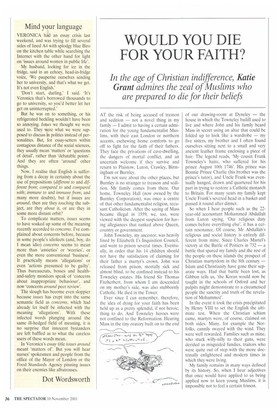Mind your language
VERONICA had an essay crisis last weekend, and was trying to fill several sides of lined A4 with splodgy blue Biro on the kitchen table while searching the Internet with the other hand for light on 'issues around women in public life'.
My husband, looking for ice in the fridge, said in an echoey, head-in-fridge voice, 'We pauperise ourselves sending her to university, and that's what we get. It's not even English.'
'Don't start, darling,' I said. 'It's Veronica that's borrowed thousands to go to university, so you'd better let her get on uninterrupted.'
But he was on to something, or his refrigerated heckling wouldn't have been so annoying. Issues we thought we were used to. They were what we were supposed to discuss in politics instead of personalities. But, for essay-setters within contagious distance of the social sciences, they usually mean 'matters' or 'questions of detail', rather than 'debatable points'. And they are often 'around' other things.
Now, I realise that English is suffering from a decay in certainty about the use of prepositions (different to and different from; compared to and compared with; immune to and immune from; and many more doubts), but if issues are around, then are they touching the subject, are they about it, or are they in some more distant orbit?
To complicate matters, issues seems to have soaked up some of the meaning recently accorded to concerns. I've complained about concerns before, because in some people's idiolects (and, boy, do I mean idio) concerns seems to mean more than 'anxieties' or 'worries', or even the more conventional 'business'. It practically means 'allegations' or even 'actions presumed to be guilty'. Thus bureaucrats, bosses and healthand-safety monitors speak of 'concerns about inappropriate behaviour', and now 'concerns around peer review'.
The slough has become even sloppier because issues has crept into the same semantic field as concerns, which had already let itself be infected with the meaning 'allegations'. With these infected words plunging around the same ill-hedged field of meaning, it is no surprise that innocent bystanders are left baffled as to what the careless users of these words mean.
In Veronica's essay title issues around meant 'matters of'. But you will hear nurses' spokesmen and people from the office of the Mayor of London or the Food Standards Agency pinning issues on their enemies like albatrosses.
Dot Wordsworth














































































































 Previous page
Previous page